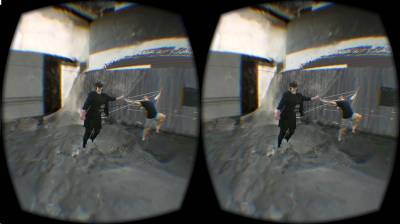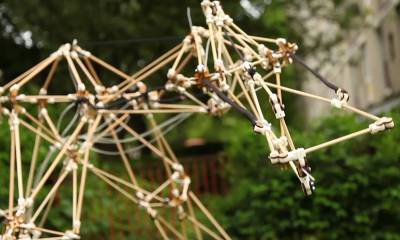This radical programme teaches students to design performances and interactive experiences.
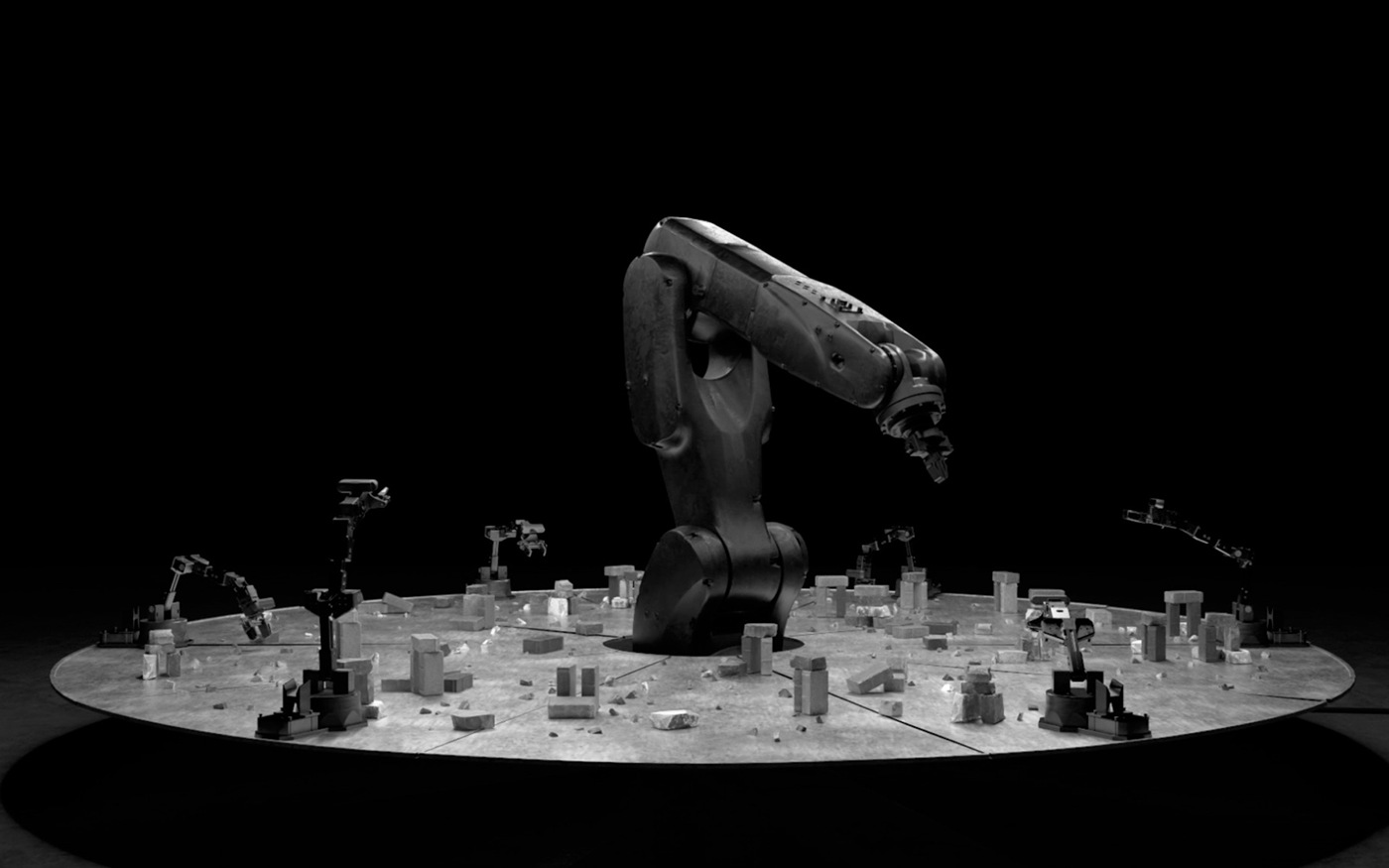
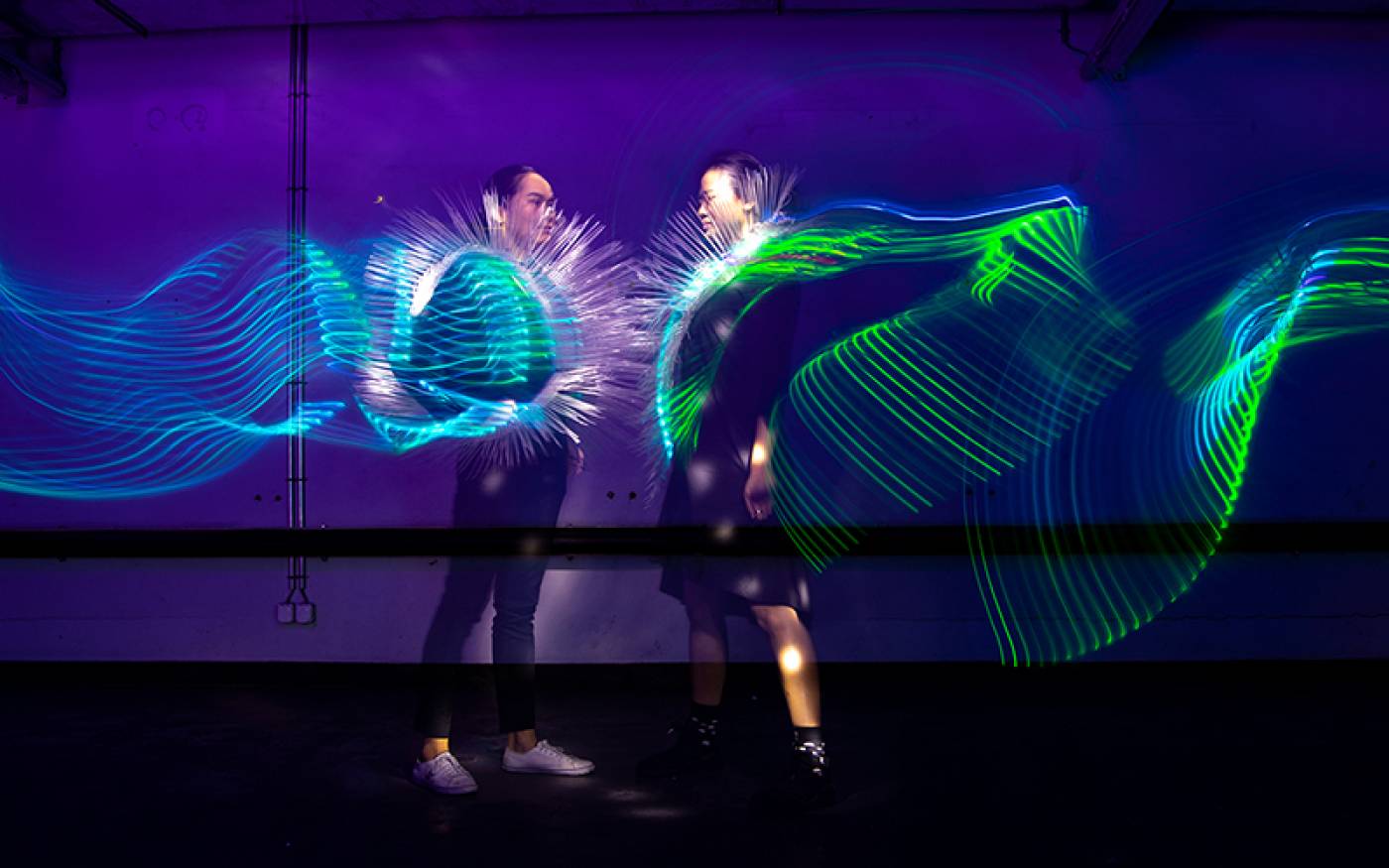
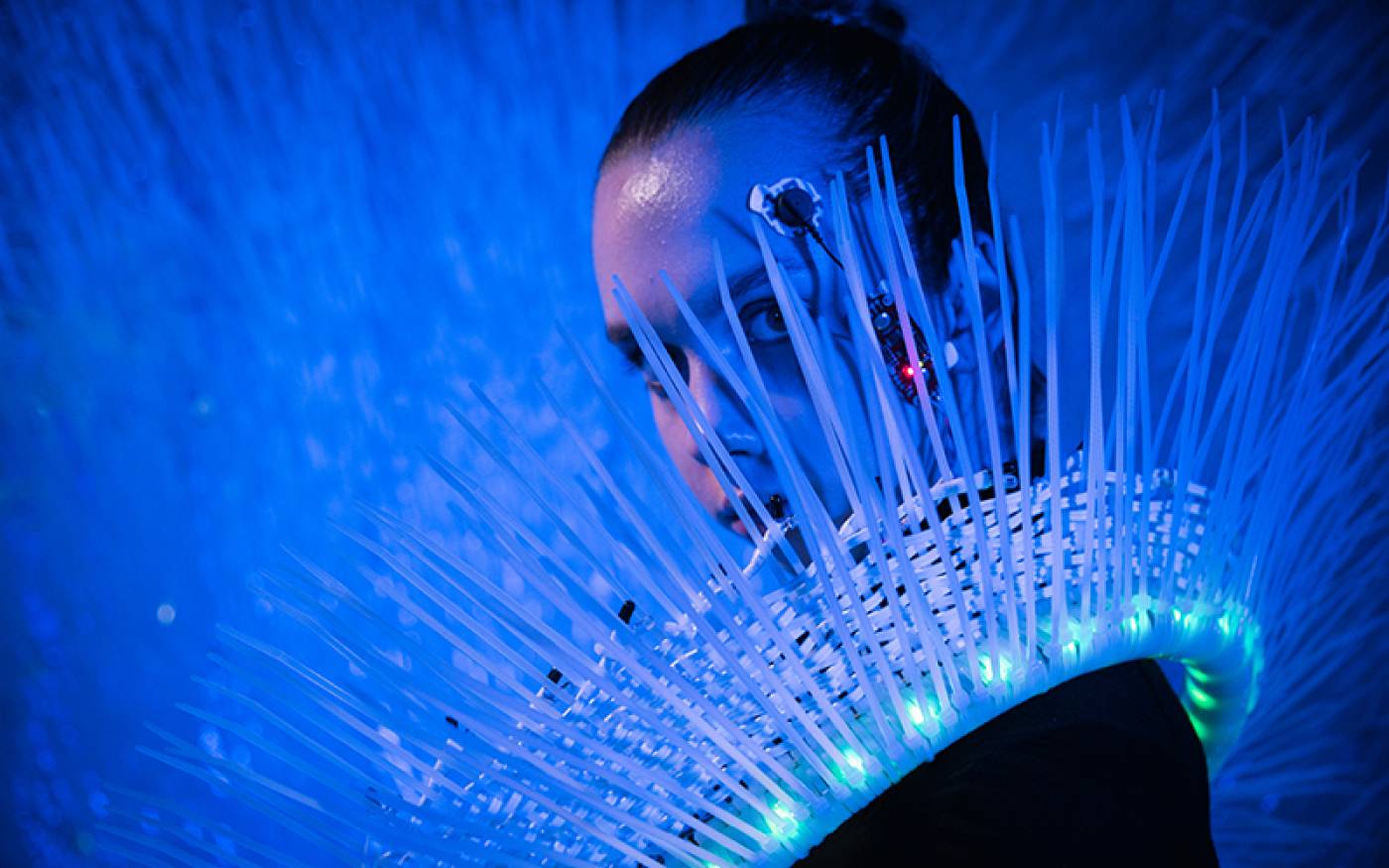
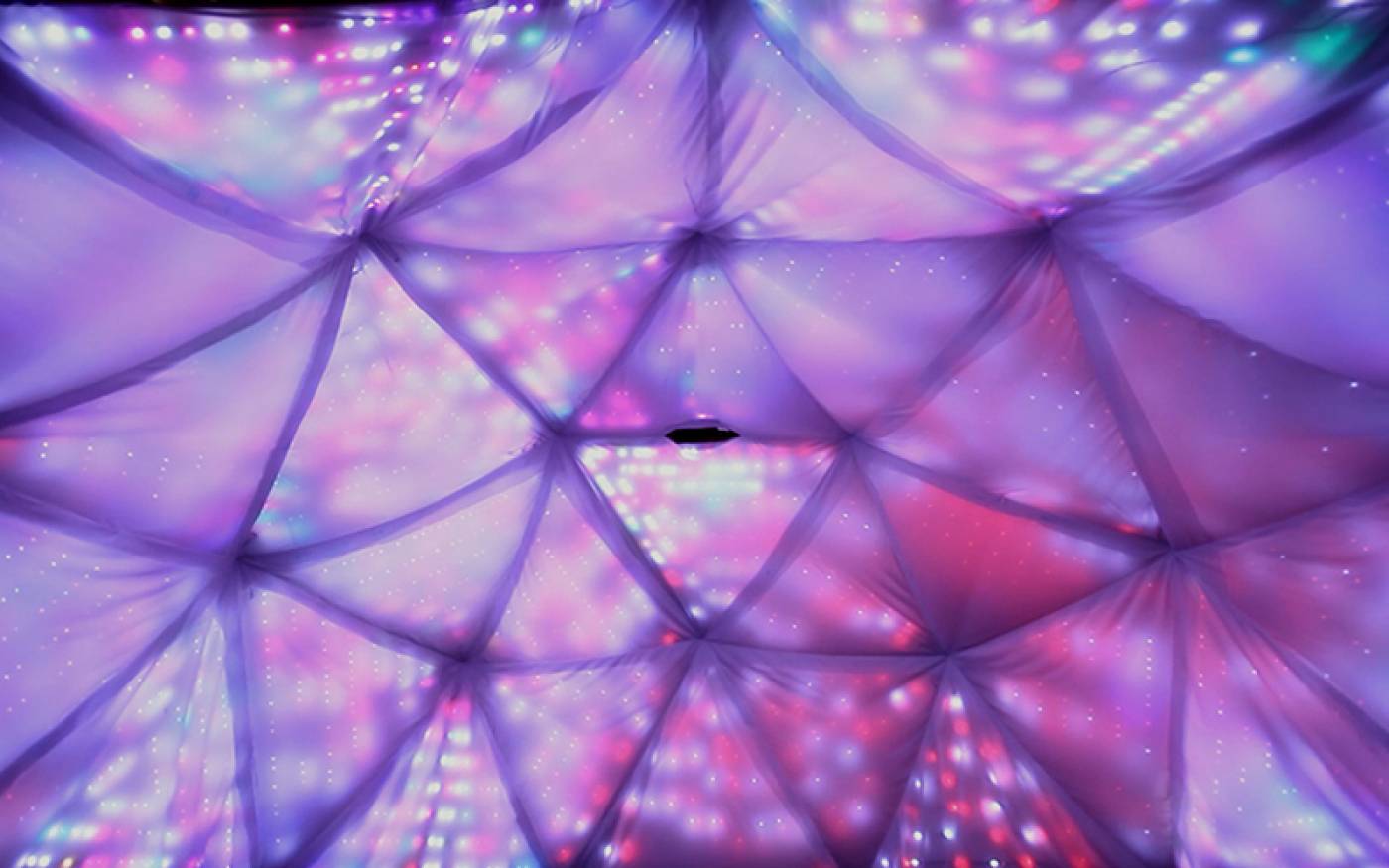
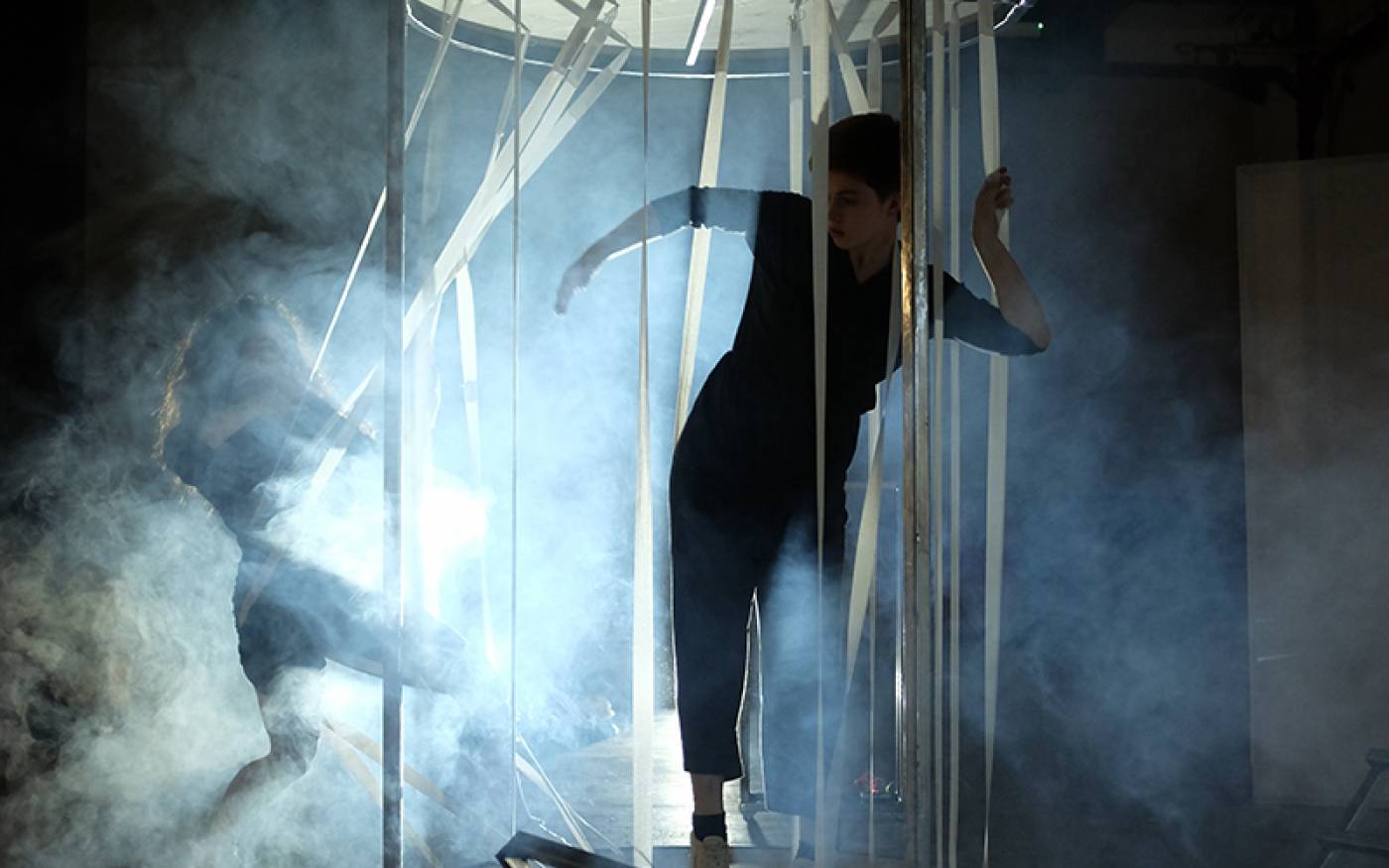
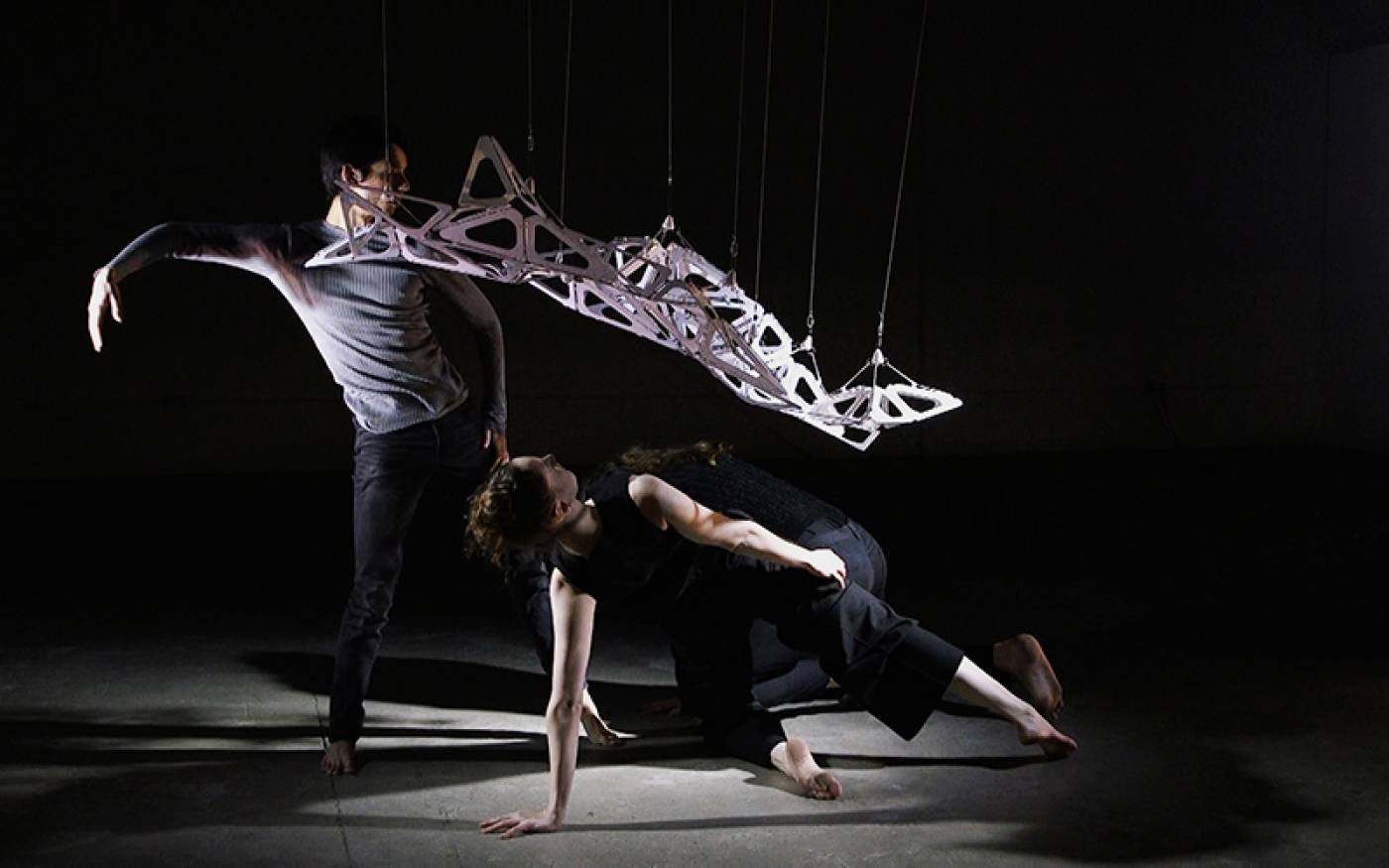
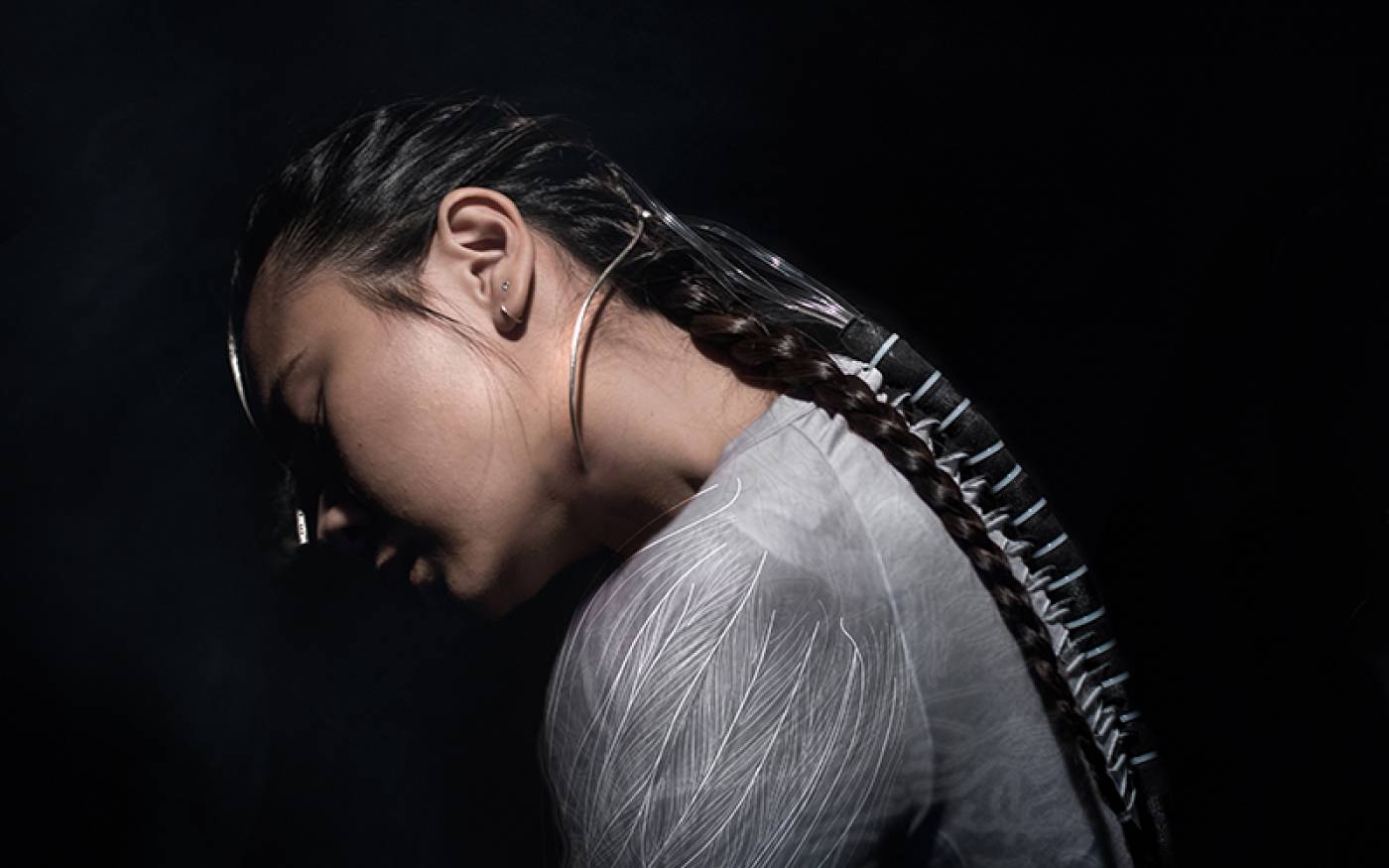
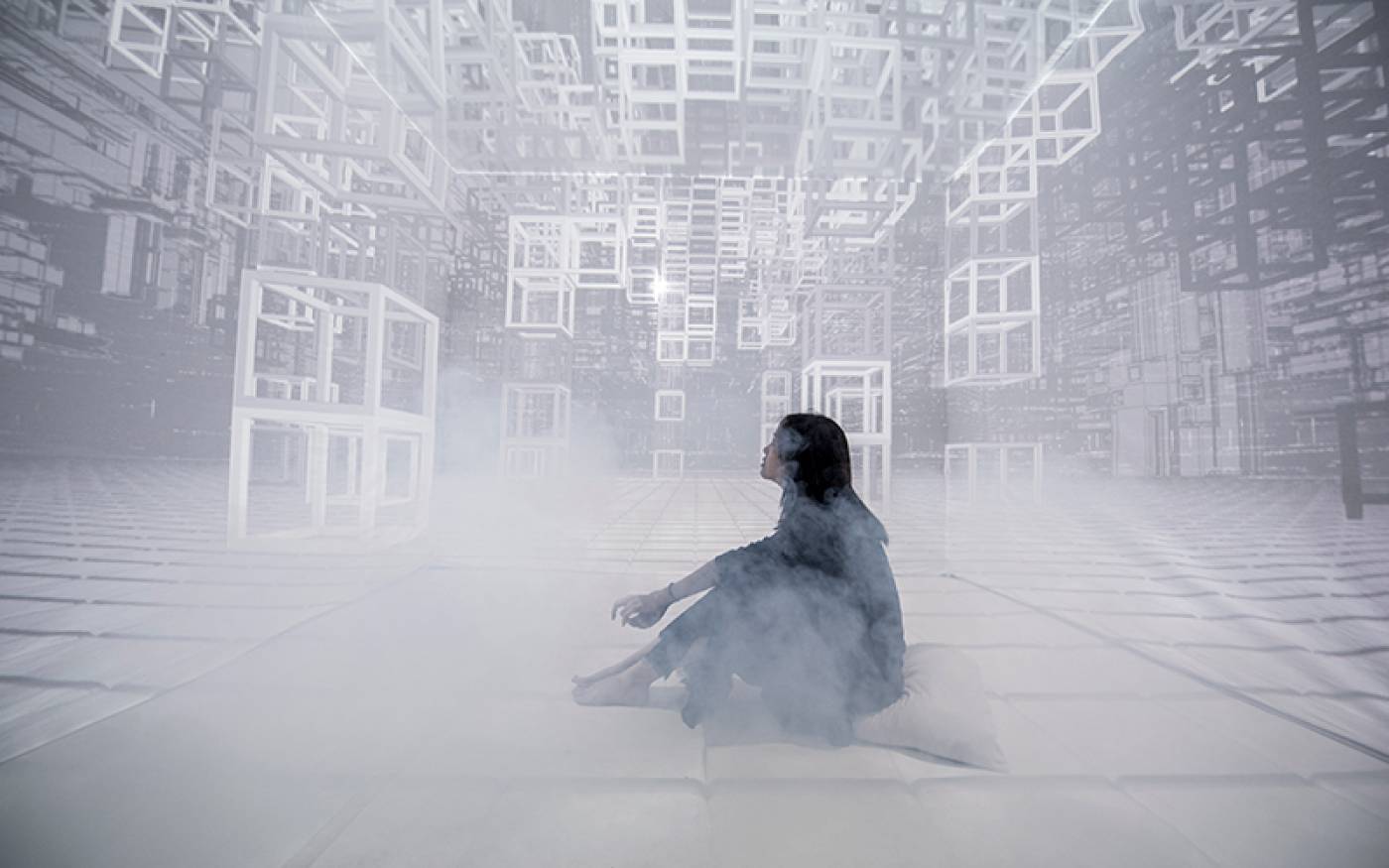
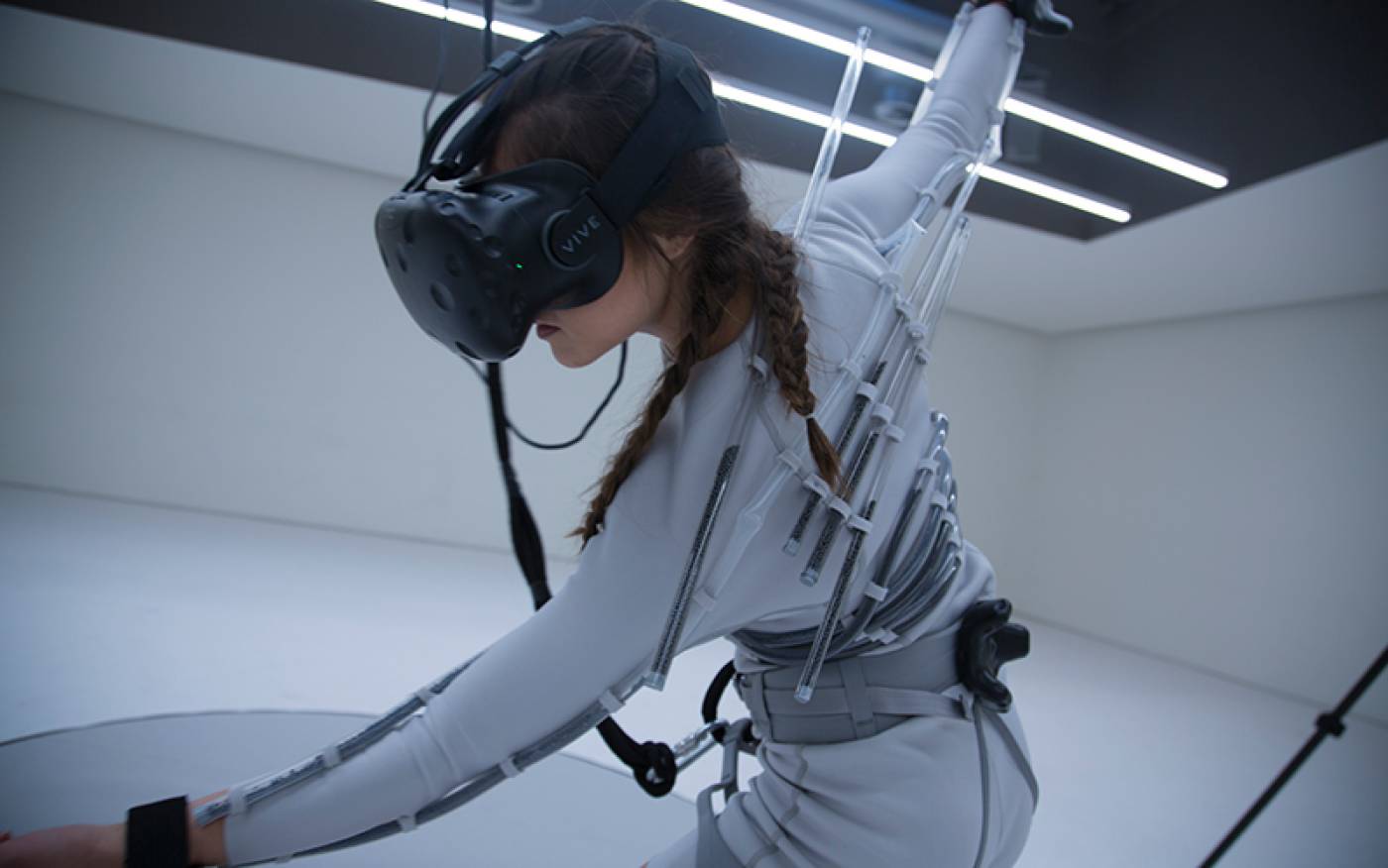
Register: Here East Architecture Open Day on 24 April 2024
About
What happens when we design not in three dimensions but four? This radical, multidisciplinary Master's degree teaches students to understand and design performances and interactive experiences.
This programme welcomes students from an array of artistic and technical backgrounds to work with interactive technologies to consider objects, space, people and systems as potential performers.
Throughout this programme, students gain advanced skills to design for performance and interaction, informed by multidisciplinary theories taken from performing arts, digital media, spatial interaction, anthropology, sociology, cybernetics, cognitive neuroscience or aesthetics.
Structured to offer the widest scope for creativity, the programme facilitates and empowers students to find their own unique design vision, with an emphasis on prototyping, from interactive objects to staged events and performance architecture.
The programme is taught in UCL’s cutting-edge facilities at Here East, Queen Elizabeth Olympic Park - a space renowned as a hotbed for technological innovation and home to some of the UK’s leading performance and design companies. These world-class facilities provide an ideal space for the large-scale construction of installations, as well as for public events.
Programme highlights
- Design and make individual and collaborative projects that feature in an end-of-year public exhibition of interactive objects, installations and performances
- Learn to communicate your ideas in three and four dimensions through animation, film, live presentation and staged events, real-time simulation, podcasts and online, virtual and augmented environments
- Gain a working knowledge of technical systems including sound, lighting, interactive computation and electronics
- Use state-of-the-art technologies at UCL at Here East including virtual reality systems, networked media spaces, motion capture rigs, multi-channel surround sound systems and robotics
- Gain an understanding of parametric tools required when designing or adapting large performance spaces including acoustics, lighting, seating (spectator line of sight) and simulation of occupant behaviour
Modules
- Introductory Design Workshops (15 credits)
Module coordinator: Jessica In (j.in@ucl.ac.uk)
Working in small groups, students take a series of week-long workshops in which they make and test both physical and virtual prototypical performative objects. Through these activities they gain get a full range of design and technical skills including: coding, electronics, parametric design, choreography, robotics, virtual reality and 3D sound design.
- Design Portfolio, Initial Project (30 credits)
Module coordinator: Jessica In (j.in@ucl.ac.uk)
Students learn processes of digital modelling and animation, alongside the role of making prototype settings, performances and interactive installations. They work in groups to create an initial set of design experiments based on a design topic of their choice. The resulting performances and interactive assemblies are presented at a public Project Fair where experts from industry and academia provide useful feedback and suggestions. The work carried out in this module inspires future projects throughout the rest of the programme.
- Design Portfolio, Final Project (60 credits)
Module coordinator: Jessica In (j.in@ucl.ac.uk)
Students build upon their experiences in the Initial Projects module by critically analysing the success of preliminary work and developing a larger scale proposal. They have the opportunity to test their works in progress at various public exhibitions (locations in the past have included the Austrian Ars Electronica Festival, the Barbican Centre, the Royal Opera House, the Bloomsbury Festival and The Bartlett Summer Show).
In tutorials and seminars, students complete their final projects in our state-of-the-art facilities at our Here East campus. The project is then exhibited in the annual Bartlett Fifteen exhibition, which is open to the public.
- Contextual Theory (15 credits)
Module coordinator: Fiona Zisch (fiona.zisch@ucl.ac.uk)
This module allows students to develop the skills to undertake a comparative theoretical study of work relevant to their initial and final projects. They develop their knowledge of the historical and theoretical background and current methods in performance and interaction, as well as the different aesthetics that might drive the design of the assemblies.
- Design Thesis Report (30 credits)
Module coordinator: Fiona Zisch (fiona.zisch@ucl.ac.uk)
Guided in seminars and tutorials, students work individually to develop a theory that underpins their individual design work and write an illustrated critical evaluation of a key aspect of their final design project. They gain an understanding of what constitutes a design research question and learn the current methods and theoretical approaches to this.
Students are guided through physical and digital experiments, to critically evaluate their chosen area of discussion. They learn how to refer to appropriate theoretical and technical sources and demonstrate how the information from these sources is synthesised in their design.
- Skills Portfolio (30 credits)
Module coordinator: Vasilija Abramovic (v.abramovic@ucl.ac.uk)
This module allows students to develop skills in both analytical digital simulation and synthetic making and to develop a record of these skills in the form of a portfolio. Students are provided with coding experience using tools such as Java/Processing, C++/OpenFrameworks, C#/Unity and Rhino/Grasshopper.
Students are also introduced to specific techniques for parametric and interactive design, robotic control, machine learning and coding for live performance. Other skills that students develop include 3D modelling, digital fabrication and Cinema4D animation.
Key information
Modes and duration
Full-time: 15 months, beginning in October
Part-time: 30 months, 90 credits per year
Flexible: two to five years
Entry requirements
A minimum of a second-class UK degree in an appropriate subject or an overseas qualification of an equivalent standard. Applicants with extensive experience in the field may also be considered.
A design/creative portfolio is also expected. Applicants will be asked to submit a portfolio of their design work once their completed application has been received, and should not send or upload work until it has been requested.
Read the full entry requirements for this programme on the UCL Graduate Prospectus
Read the full guidance on portfolio preparation
Application guidance for 2024 entry
Applicants can only apply for a maximum of two postgraduate degree programmes at The Bartlett School of Architecture.
Application deadline
Applications for 2024 entry will open on 16 October 2023 and close on 5 April 2024 (for applicants requiring a visa) and 30 August 2024 (for applicants not requiring a visa). We strongly advise early application, as our programmes are oversubscribed and competition is high.
Deferral
It is not possible to defer an offer at The Bartlett School of Architecture. If you wish to be considered for the following year then you must reapply in the next admissions cycle.
Tier 4 Student visa holders
Tier 4 Student visa holders are required to meet the English language proficiency of their offer with sufficient time to obtain a CAS number and visa.
Accepting your offer
To accept your offer, you must pay the non-refundable fee deposit and decline any other offers for programmes at The Bartlett School of Architecture. If you do not respond within the given time indicated on your UCL offer letter, then your offer will be withdrawn.
Fees and funding
- Tuition fee information can be found on the UCL Graduate Prospectus.
- Please note, if you are planning to fund your studies with a Postgraduate Master's Loan, the instalments and the UCL fee payment deadlines do not align due to the duration of this programme. You will need to personally fund any shortfall until the remainder of your loan is paid to you.
- For a comprehensive list of the funding opportunities available at UCL, including funding relevant to your nationality, please visit the Scholarships and Funding section of the UCL website.
Staff
Design for Performance & Interaction MArch draws upon the internationally recognised expertise within The Bartlett Faculty of the Built Environment, as well as across UCL.
- Dr Fiona Zisch, Programme Director and Theory Coordinator
Fiona Zisch is an architect and cognitive scientist with experience in film production design and designing for extreme environments. Her research explores cognitive ecologies with a focus on intuition and radical (4EA) embodiment, neurorehabilitation spaces in physical and virtual – and eXtended – environments, as well as how ‘neuroarchitecture’ as transdisciplinary threshold might develop more wicked thinking.
Fiona is the Programme Director of Design for Performance and Interaction March. She leads the programme’s Contextual Theory stream and runs a Design Pathway. Fiona also supervises students on the Architectural Design MPhil/PhD. She has lectured extensively at architecture schools internationally and regularly gives invited lectures, as well as sitting on advisory boards and acting as external examiner. Fiona leads the research group bodyLAB and, together with Hugo Spiers, chairs the UK chapter of the Academy of Neuroscience for Architecture (ANFA).
- Dr Ruairi Glynn, Programme Director
Ruairi Glynn is Associate Professor at The Bartlett, a practicing installation artist and part of the Interactive Architecture Lab. He has exhibited internationally with recent shows at the Centre Pompidou in Paris, the National Art Museum of China in Beijing, and the Tate Modern in London. He has worked with leading cultural and research institutions including the Royal Academy of Arts, the Medical Research Council and BBC and has built public installations for commercial clients including Twitter, Nike and Arup. Ruairi works collaboratively with artists, architects, and choreographers including Shobana Jeyasingh Dance Company, New Movement Collective and Alma-nac Architects.
- Jessica In, Design Coordinator
Architect, designer and creative coder, Jessica is interested in physically embodied interactions specifically focused on drawing with code, machine learning and robotics. Her 2018 work NORAA is currently part of the Ars Electronica Center’s year long show Understanding AI, and in 2019 was one of Max Cooper’s collaborators for his audio-visual project Yearning for the Infinite commissioned by The Barbican. Other recent exhibitions include the V&A Digital Design Weekend (2018), Roca Gallery London (2019), and NeurIPS Creativity (2018).
- Vasilija Abramovic, Skills Coordinator
Vasilija Abramovic is an architect, designer and doctoral researcher. Her interest lies in the field of artificial life approaches to interactive architecture, building responsive environments with recent exhibitions in France, Netherlands and Belgium. Her work has been published in conferences and journals, most recently at ACADIA 2018, and eCAADe 2017. Vasilija is also a scientific committee member and editorial board member for scientific journals and has held academic roles across several universities, including the Faculty of Architecture in Prague, the University of Westminster and The Bartlett School of Architecture.
- Ava Aghakouchak, Tutor
Ava Aghakouchak is an architectural and interaction designer. She is currently a PhD candidate at The Bartlett School of Architecture where she is carrying out her research on the effects of active wearables on the loop between the body-mind, machines and the built environment.
Ava’s interest in designing human-machine interfaces resulted in her MArch graduate design project “Sarotis”, which was highlighted by Domus as one of the top ten design projects of 2016. Since then, she has shared her research progress at venues such as Here East (2018), Resonate Media Arts Festival (2017), The Bartlett School of Architecture (2017), King’s College London (2017) and Royal College of Art (2016).
Ava is a member of the Interactive Architecture Lab, UCL, where she supervises Design for Performance & Interaction (MArch) thesis reports. She also teaches BA Architecture and Interior Architecture & Design at Canterbury School of Architecture, UCA.
- George Adamopoulos, Tutor
George Adamopoulos is a computational designer, creative coder and architect specialising in Computational Geometry and Computer Graphics. As well as teaching, he designs and programs large-scale interactive art installations at Jason Bruges Studio. George's work explores the connections between the fields of virtual/mixed reality and architecture, and the use of real-time graphics and computational geometry as building tools for cross-disciplinary narratives.
- Paul Bavister, Tutor
Paul Bavister's award-winning architect practice specialises in public sector design, in particular acoustic and performance spaces. Paul is an active member of sound art group Audialsense, and has lectured internationally on the relationships between sound and architecture. Paul is Senior Associate Director at Flanagan Lawrence, Director of Soundforms, and both a design tutor and PhD candidate at The Bartlett School of Architecture.
- Dr Sandra Campione, Tutor
Dr Sandra Campione is a photographer and documentary filmmaker with a PhD in aerospace engineering. She collaborates with artists, designers, and architects documenting their work with a focus on revealing the process behind their practice. Sandra has worked with many artists, including Marshmallow Laser Feast, Universal Everything, Studio Roso, and Flat-E.
- Professor Stephen Gage, Tutor
Stephen Gage is Professor of Innovative Technology at The Bartlett, an internationally recognised leader in the education of interactive and performance architecture. He has taught at The Bartlett since 1993, holding posts as Director of Technology and Director of Architectural Design as well as leading various funded research projects, and supervising Master's and PhD students. His graduates are now some of the industry leaders in interactive and performance architecture including Jason Bruges, Dominic Harris & Usman Haque, to name just a few.
- Alberto Fernandez Gonzalez, Tutor
Alberto Fernández González is an architect, academic and researcher. His career has developed between academia and professional practice, with a focus on building information modelling, generative design and digital fabrication in different scales. Alberto’s work has been recognised internationally by the LAFARGE HOLCIM Award Next Generation, Archiprix International, Sunbrella Future of Shade, UIA-La Biennale di Venezia and Evolo Skyscrapers among others.
- Parker Heyl, Tutor
Parker Heyl is a mechanical engineer, educator, roboticist, and artist. Parker studied in Boston where he became involved in the maker movement, conducting research on maker curriculums at the Developmental Technologies Lab at Tufts University, Scratch Jr. at the MIT Media Lab, the Cambridge Friends School Makerspace, and The Eli Whitney Museum and Workshop. He has worked as a roboticist at the Harvard iLab developing soft robotic grippers, and as a hardware designer at the start-up incubator Greentown Labs. Parker is a graduate of the IALab and has publicly exhibited his thesis project in London, Chicago, Prague, and Vilnius.
Parker currently works as a kinetic sculptor and installation artist. He has designed work for galleries including CentroCentro Madrid, Arad Contemporary Art Center, M.A.D. Gallery Geneva, and the Venice Biennale of Architecture. He has created kinetic set designs to support live musical performance, including Crumb, Floating Points, Daphni, Melissa Weikart, and Four Tet, at venues such as FOLD London, Brookyln Steel, and Coachella Music Festival.
- Nikoletta Karastathi, Tutor
Nikoletta Karastathi is an architect, PhD Candidate and Lecturer at Design for Manufacture at The Bartlett. She has a diverse background; working in the industry as a practising architect and in academia. As a practising architect, she has worked for eight years in award-winning practices in Newcastle (Napper Architects) and London (Chapman and Taylor) at one of the top 25 AJ practices. In parallel, she has taught as a design tutor in undergraduate and postgraduate studios at Bristol, Cardiff, Newcastle, and Edinburgh. She is passionate about the benefits and application of research in practice, which she has promoted by leading the Northeast RIBA Research and Innovation Group (2016-2019). She has also been a Jury member for the 2019 RIBA President's Awards Research. Her work has been exhibited at the London Design Festival, Dutch Design Week, Lakeside Arts Gallery and the Baltic Centre of Contemporary Arts. Her interests lie in architecture, textiles, computation, and material programmability.
- Michael Wagner, Tutor
- Emma Kate Matthews, Tutor
Emma-Kate Matthews is an architect, composer, musician and researcher at UCL. Her work explores creative reciprocities between music; as constructed sound, and architecture; as constructed space, through the composition and performance of site-specific and spatialised projects. In addition to composing on the London Symphony Orchestra’s Panufnik scheme (2022), her work has been performed internationally at acoustically distinctive sites such as the Sagrada Familia in Barcelona, London’s Southbank Centre the Barbican Centre and Brighton Festival. She has released a number of solo electronic-classical fusion works including ‘Similis’ on Musicity Global (2019) ‘Far Flung’ on Algebra Records (2020), and ‘Remote Overlap’ on NMC Records (2021). In addition to being a multi-instrumentalist, she also designs and makes her own sonic instruments using bespoke digital simulation and fabrication tools. She was nominated for the Lumen prize for Art and Technology 2021 and the Aesthetica art prize 2022 for her project ‘Resonant Bodies’ which was also exhibited at the Works + Words biennale in Copenhagen in 2022. Her research has been published in many peer-reviewed journals including Organised Sound (Cambridge University Press) and HSSCOMMS (Nature).
- Jonathan Tyrrell, Tutor
Jonathan Tyrrell studied architecture at the University of Waterloo in Canada where he also taught as an adjunct professor from 2013-2020. He was an associate at Dereck Revington Studio in Toronto, where he led a series of award-winning public art projects and memorials from conception through to fabrication. Prior to this he worked extensively with Philip Beesley on the Hylozoic Series, developing specialised experience in interactive system design, digital fabrication, and component design while leading complex installations at major art festivals across North America, Europe, and Asia.
Jonathan is currently undertaking a PhD at The Bartlett School of Architecture where he is also contextual theory tutor in Design for Performance and Interaction MArch and Design for Manufacture MArch. His research is funded by the UCL Overseas Research Scholarship, The Graduate Research Scholarship, and the Social Sciences and Humanities Research Council of Canada.
- Alexander Whitley, Tutor
Alexander Whitley is a choreographer and dancer who has created work for several of the UK’s leading companies including the Royal Ballet, Balletboyz and Birmingham Royal Ballet. He is a New Wave Associate artist at Sadler’s Wells Theatre, and an associate artist at DanceEast. He collaborates across art forms, working with filmmakers, designers, digital artists and composers to broaden the scope of dance. Alexander's Dance Company has enjoyed sell out performances at the Royal Opera House and Sadler’s Wells as well as being nominated for a Critics’ Circle Award. The company has rapidly established a reputation for its ambitious and intellectually engaged work and has developed a wide network of world-class collaborators.
- James Wilkie, Tutor
James Wilkie is a Sound Artist based in the U.K. He holds a Bmus in Film Scoring from Berklee College of Music and an MMus in Sonic Arts from Goldsmiths. This hybrid skill set has offered James an exciting range of collaborations including making ambient music design for film composers Hans Zimmer and Geoff Zanelli at Remote Control Productions to immersive installations for OPPO phones and media artist Jiayu Liu, leading the creation of a Public Outreach soundwalk for Lewisham Council's rejuvenation of Beckenham Place Park, to creating intermodal sensory work together with Sensory Experiences for Bentley Motors.
James’ own work as explores the connections between spaces and the imagination in sound through directed listening, A/V compositions + installations, text, and live performances.
- Dominik Zisch, Tutor
Dominik Zisch is a creative technologist, with a background in architectural technology, theoretical physics, and software engineering. He works at Jason Bruges Studio and also teaches on the MArch programme at Innsbruck University. Dominik has collaborated with UCL experimental psychology as chief app developer for a series of navigation experiments in the real world. He has a passion for user interaction design with an emphasis on programming and dedicates his time outside of work to researching new ways to interact and work with technology and data.
- Affiliated practices and groups
Our staff are very closely linked to a large network creative practices, in particular:
- Arup
- Bompass & Parr
- Ciminod Studio
- Jason Bruges Studio
- Intel
- Marshmallow Laser Feast
- onedotzero
- Rose Bruford College of Theatre and Performance
- Royal Central School of Speech and Drama
- ScanLAB Projects
- Shobana Jeyasingh Dance Company
- Stufish
- Troika
- Soundform
- Umbrellium
The programme also has long-standing collaborative relationships with institutions such as the Royal Central School of Speech and Drama, the Royal Academy, the Roundhouse, Tate Modern, and the BBC.
Careers
The Bartlett School of Architecture is one of the world's top-ranked architecture schools and our graduates enjoy excellent employment opportunities and the potential to carry out future doctoral research in the field.
This programme empowers graduates with specialist knowledge and skills that are relevant across a wide variety of areas and creative industries, including spatial and urban design, lighting and sound installation, performance and event design, and virtual and physical community building.
Contact
Programme Directors: Fiona Zisch and Ruairi Glynn
Departmental Tutor: Claire McAndrew
Programme admissions enquiries: Complete the contact form
Programme Administrator: Daniel Rodriguez
Lead image: 'Sisyphus' by Kachi Chan | Design for Performance and Interaction MArch, 2020-21
 Close
Close


